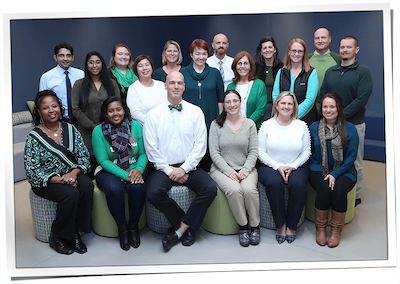
Today, evidence generation remains DCRI's central focus as our research informs clinical guidelines, drug dosing, and more. By designing and conducting randomized controlled trials and observational studies, as well as managing large-scale registries, the DCRI generates evidence that improves outcomes and health around the world.
CHAPTER 1
Improving Clinical Care: Finding the Right Answers to Benefit Patients
By combining clinical insights with biostatistical methods and operational expertise, the DCRI developed a unique model for evidence generation. From GUSTO-I to ADAPTABLE—and every study in between and beyond—DCRI studies are designed to directly impact patient care.
CHAPTER 2
Filling the Gap: Generating Evidence Where it Doesn't Exist
How do you find answers in a space where no data yet exist? By creating networks to multiply the amount of research that can be done. DCRI faculty speak about the institute's leadership in the creation of networks in the pediatrics, lung transplant, and antibacterial resistance spaces.
CHAPTER 3
Better Together: Critical Collaborations Lead to Success
No DCRI project could be successfully completed without collaboration. The institute works with a wide range of partners, including sponsors, other academic research groups, and site investigators who oversee daily study conduct.
Evidence That Makes an Impact
- The DCRI is the clinical and/or data coordinating center for over 10 federally-funded networks totaling over $500 million in funding.
- The DCRI serves as the coordinating center for the Pediatric Trials Network, which has provided data for label changes for 15 drugs, enabling the FDA to update critical prescribing information for the nation's pediatric populations.
- DCRI’s Clinical Events Classification (CEC) service, founded in 1997, has completed 250+ trials involving 250,000+ patients, for which it has completed 425,000+ adjudications.
- DCRI’s study ARISTOTLE was recognized in 2019 by Jeffrey Drazen, the NEJM’s former editor-in-chief, as one of 12 “practice-changing and life-saving” studies, selected from nearly 4,000 studies published over a 19-year period.
- The DCRI Outcomes and Real-World Evidence Call Center offers a highly effective way to generate evidence. From 2014 to 2020, the Center reached more than 90,000 participants over 9 studies and collected health data for more than 92% of the study universe.
DCRI On Record
DCRI-ers past and present take a trip down memory lane to explore the creation of key offerings, favorite memories, and more.
Stanford's Ken Mahaffey, MD, co-founder of DCRI's Clinical Events Classification service, and DCRI's Matt Wilson, RN, discuss the creation of the service.
Danny Benjamin, MD, PhD, MPH, and Micky Cohen-Wolkowiez, MD, PhD, talk about how the Pediatric Trial Network's research has contributed to the care of infants.